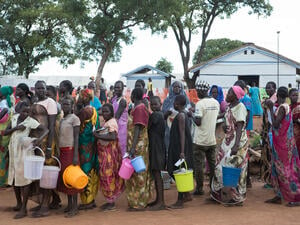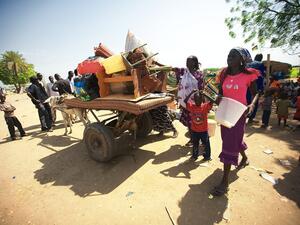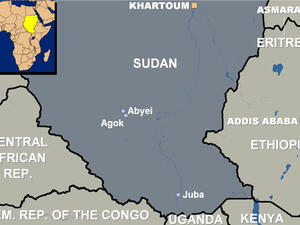Last Ethiopia-Sudan repatriation convoy of the season as rains set in
Last Ethiopia-Sudan repatriation convoy of the season as rains set in

Returnees from Bonga Refugee Camp in Ethiopia arrive at the Gindi reception centre in southern Sudan's Blue Nile state after years in exile.
KURMUK, Sudan, May 7 (UNHCR) - A convoy carrying 618 refugees, including a new-born baby, has arrived in southern Sudan's Blue Nile state, bringing an end to UNHCR's 2006-2007 dry season repatriation programme from camps in Ethiopia.
The 17-truck convoy, operated with the International Organization for Migration, arrived in the border town of Kurmuk in Blue Nile state last Thursday after a three-day journey from Bonga Refugee Camp in Ethiopia. Despite the tedious trip, the returnees were in good spirits after spending up to 20 years in exile.
The onward journey to their homes in the villages of Gindi and Chali was hindered because of heavy rains in the Kurmuk area on Wednesday, which made the roads difficult to navigate.
As a result of the conditions, which will get worse as the rainy season sets in, UNHCR has decided that this convoy - the 10th from Ethiopia to South Sudan this year - will be the last until the dry weather returns in November.
Some were looking back to returning to their homes, others were excited at seeing the Sudan for the first time. "I was born in Bonga camp, this is the first time I will see Sudan," Samira, an 18-year-old mother, said on arrival at the reception centre in Gindi.
She and her family planned to stay with relatives in Gindi until they have constructed their own tukuls - traditional circular shelters made of wood, mud and grass. "If not, we sleep in the open. It does not bother us, as long as we are in our own country," she added.
Gindi and Chali are the main return areas in the south of Blue Nile state and both have grown rapidly as repatriation picked up over the past year. "When I arrived here a year ago there were only a few people around," said Jelvas Musau, a UNHCR field officer in Kurmuk. "Since repatriation started in April 2006, we have received 17 convoys and brought back 11,747 people to this area."
He said that as more people came back, the need for infrastructure, basic services and income-generating projects became more important. But development projects in one of South Sudan's poorest regions are being hampered because Blue Nile is considered a transitional state whose borders have yet to be formally demarcated.
The returnees on the convoy were keen to contribute to the revival of their home districts after so many years of conflict. "I was trained as a blacksmith," said Oda, who was returning home after more than 20 years as a refugee in Ethiopia. "If I can get tools, I will open a shop. If not, I'll work as a farmer on my land," added the father of four in Gindi.
Most of the returnees brought back furniture. UNHCR gave them non-food items such as plastic sheets, buckets, mats, kitchen sets and mosquito nets while the World Food Programme handed out food packs for three months.
"The plastic sheets are particularly needed now that the rains will start. We use them to cover the grass roofs of our tukuls," said Rouven, 25, who returned last year and now works as a community services assistant for the Sudan Social Development Organization, UNHCR's main implementing partner in Kurmuk.
UNHCR staff will monitor the welfare of the returnees during the rainy season and focus on reintegration projects - including schools, health clinics and water and sanitation plants - for returning refugees and internally displaced persons.
UNHCR has repatriated more than 13,200 refugees to Blue Nile state from Ethiopia over the past year. Some 3,000 displaced people have returned to their homes in the Kurmuk area. By the end of April, the UN refugee agency had repatriated 58,919 refugees to southern Sudan from neigbouring countries. An estimated 300,000 Sudanese are still in exile.
By Annette Rehrl in Kurmuk, Sudan






